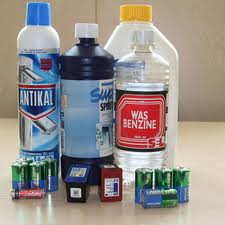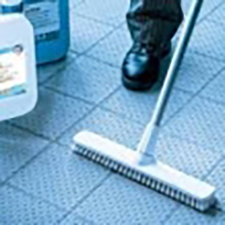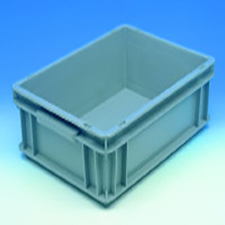Page content
Risks of cleaning products

Many cleaning products contain substances that are harmful to the environment and our health. These substances can have an irritating or harmful effect. In terms of health, the effects on the skin are an important point of attention. For example, highly alkaline or acidic detergents can cause burns. There are also products that can lead to respiratory problems.
In practice, the effects of cleaning products and exposure to them are often underestimated. If a hazardous substance occurs in a cleaning product in a certain concentration, the product itself also falls under the hazardous substances.
Detergents are highly concentrated and therefore dangerous. A seemingly harmless cleaning agent can contain as much as 10% lye. That should be on the label and in the VIB. In the manual or the instructions for use, you can check whether the concentration of use is also dangerous.
Disinfectants also fall under the hazardous substances because they contain, for example, alcohol, glutaraldehyde, formaldehyde, phenol, chlorine or iodine compounds.
Before purchasing such a substance, consult the NFU Hazardous Substances Database so that you can gain insight into the harmful effect of the cleaning agent and the correct control measures.
Which cleaning products

Cleaning products used in hospitals are the products used by the cleaning services and the products used in the cleaning equipment.
Cleaning of surfaces and equipment, especially in the patient environment, is strictly protocolled. Often, preference is given to using damp microfiber cloths instead of chemical detergents. Consult the cleaning and disinfection protocol of your umc to see which agents are allowed.
Reducing risks
Below you will find a number of important measures:
- If possible, use less harmful alternatives. Consult the Hazardous Substances Register for this.
- If necessary, make an appointment with the hospital hygienist for disinfection.
- Draw up a work instruction (if necessary also in another language) and keep it with the product.
- Deliver the cleaning products ready for use as much as possible.
- Add detergent to the water, instead of water to the detergent, when it is necessary to make a dilution.
- Read the label before use.
- When cleaning, be careful with the use of different agents interchangeably. Some agents react with each other, which can create a toxic vapor (especially in combination with chlorine).
- If you clean with a strong detergent and then with chlorine, or vice versa, rinse with plenty of water in between.
- Preferably work with cleaning products in containers of less than 10 liters.
- Do not nebulize: avoid excessive inhalation due to aerosol formation.
- Use gloves: avoid direct skin contact.
- If necessary, use other personal protective equipment, such as work clothes, (splash) glasses.
- Provide absorbents in the immediate vicinity so that in the event of a spill, it can be cleaned up quickly.
- Place cleaning products containing hazardous substances in a drip tray.
Which disinfectants
Because of their disinfecting effect, working with disinfectants requires extra care. The regulations on disinfectants are in full swing. Adhere to the following rules:
- Only use disinfectants that are authorized in the Netherlands and that are also authorized by the Department of Hospital Hygiene and Infection Prevention.
- Ensure adequate ventilation and, if necessary, good extraction.
Mandatory registrations
All disinfectants that can be discharged must be registered and registered with the Water Board in the context of the Surface Water Pollution Act permit.
More information
For more information about disinfectants, please contact the hospital hygienist. For information about personal protective equipment and ventilation, please contact the occupational health and safety advisor (arboadviseur).

